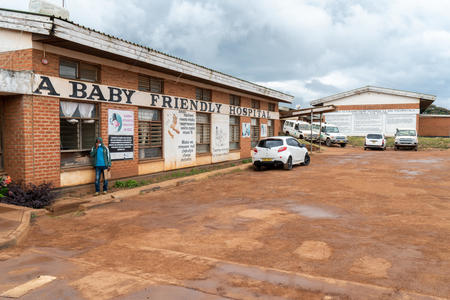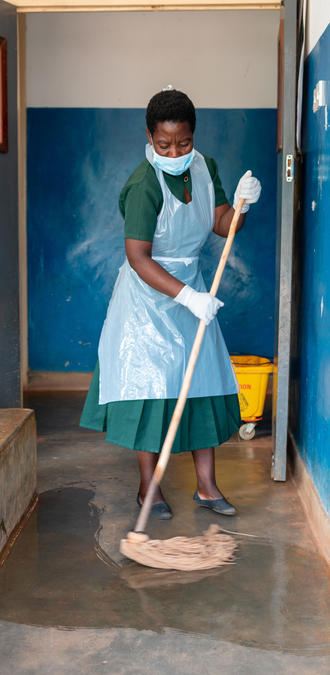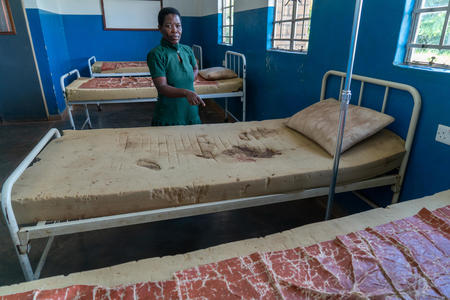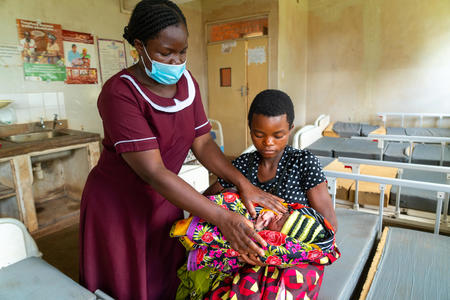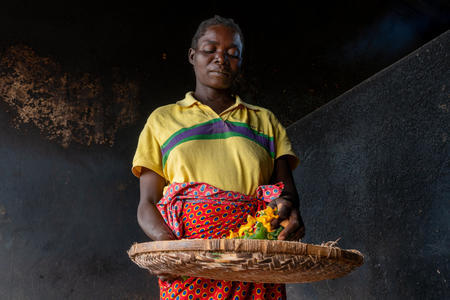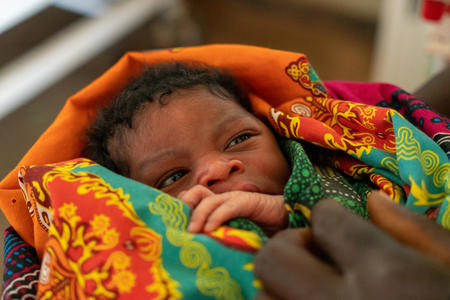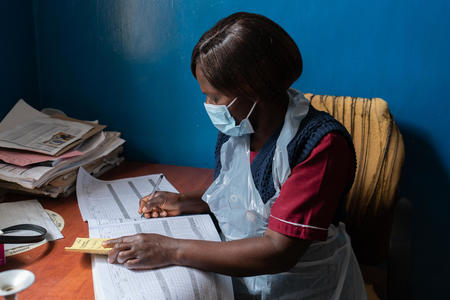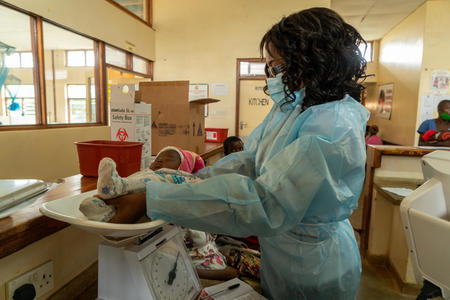Wards without water: the challenges of providing maternal care in rural Malawi – photo essay

Malawian healthcare workers face challenges from all sides. More than half of healthcare facilities in Malawi do not have hand washing facilities, almost two thirds have no decent toilets, and almost one fifth does not have clean water on site. With cases of COVID-19 in the country continuing throughout the year, staff are working through the pandemic without a basic first line of defence against infection.
For midwives and those involved in maternity care, this absence is frightening. Without water, toilets and soap, health centres – the very places supposed to keep mums and babies well – become breeding grounds for the rapid spread of infectious disease.
Globally, one million mothers and newborn babies die from infections soon after birth each year. This is a tragedy that could easily be prevented with something so simple: soap and water.
Ahead of the World Health Assembly, WaterAid spoke to health workers, patients and families in Ntchisi District, Malawi, about the challenges of keeping mums and babies safe in this environment.
Ntchisi is a rural district in the central region of Malawi. There are four healthcare centres: Ntchisi District Hospital as well as Kangolwa, Mkunzi and Khuwi health centres.
None have adequate water, sanitation or hygiene facilities. Mothers and babies are at risk of catching and spreading infectious diseases – and staff struggle to keep the environment clean. WaterAid and the Wimbledon Foundation are working together to bring clean water, decent sanitation and good hygiene to these four healthcare facilities – a change which will impact 300,000 people.
But still, almost 2 billion people are at risk every day because they go to work or seek care at a hospital or clinic without these fundamental services.
Chrissy Kaotche, a health attendant at Khuwi Health Centre, collects water four times a day from community boreholes 300m away from the health centre. The boreholes are crowded and she has to either spend time queueing, or fight her way to the front of the line, explaining that she is collecting water for the health centre.
Chrissy worries that when she leaves the hospital to do this, she leaves her colleague alone to look after a number of mothers and babies. This means that some patients are left on their own and, at times, when both the baby and the mother require urgent care, one loses out. On any maternity ward, any moment can be critical. “The time we leave the hospital to fetch water can literally mean the difference between life or death for women and babies,” says Chrissy.
Even though the health centre staff know how important hand washing is as a first line of defence against COVID-19 and other infectious diseases, there simply isn’t enough water to make this happen, or to keep the hospital surfaces clean.
During this time of COVID-19, we have been trying our best to make sure that water is available for people to wash their hands before getting any medical attention, but we just can’t keep up with the huge number of people. It is important to keep the surfaces of the hospital clean so that we don’t become a conduit of spreading the virus.
Khuwi Health Centre attracts many patients due to its location alongside the main tarmac road to Ntchisi District. But the centre bears the scars of somewhere that has, for a long time, struggled with access to water, hygiene and sanitation. In the maternity ward, women who have no other way to clean themselves once they deliver a baby have resorted to cutting away pieces of the mattress and using them as sanitary pads.
Kangolwa Health Centre’s busy labour ward delivers between 40 and 60 babies every month. Unfortunately, there is only one working toilet for the entire labour ward and this is often blocked. Only one woman can wash in the bathroom each day as it fills up with water and blood. Some mothers are asked to walk to the other side of the health centre to use a shared bathroom for relatives who are caring for patients at the hospital. This bathroom is often blocked too.
Steria Botoman, community midwife assistant, says:
Imagine asking a woman who has just given birth to walk all the way to the other side of this facility with blood dripping all the way. It is heart-breaking, but we just don’t have any other options.
Loveness Saulosi’s one-day-old grandson was born at
For the past three days, we have had challenges accessing water. Especially here at the kitchen, there is no running water. Imagine having to walk several times in a day to fetch water not just for drinking, cleaning plates, pots and other eating utensils ... but also fetching water for everyone who is here at the hospital. It is not easy.
One in three healthcare facilities globally do not have readily available access to hand washing facilities, and almost half of healthcare facilities in the world’s poorest countries have no clean water. Without these bare essentials, newborn babies are needlessly at risk from infection and disease.
During the last year, the fundamentals of clean, safe care have been highlighted to everyone.
Community midwife technician Eunice is adamant that hospitals without running water and decent hygiene pose a threat to public health:
We need thorough hand washing in our line of duty. With no water, we can’t wash our hands. People are not even washing their hands when they enter the hospital due to lack of water. We are at great risk as health workers, not forgetting the patients we have to attend to. Instead of patients getting help from this clinic, they are getting infections. Simply because we have no running water. Water is life. Without it, we are doomed.
Hand washing provision in Ntchisi District is shockingly inadequate. Aviss Chioko, 29, a nursing officer on the postnatal ward in Ntchisi District Hospital, has been working through the pandemic with an intermittent water supply, preventing regular hand washing. Aviss is worried she is passing on infections to patients:
Handwashing during this COVID-19 era has been a challenge. But most of the time we don’t have running water here at the district hospital or at other health facilities. This puts us at risk of acquiring infections and passing on some of those infections to patients.
Two years ago, the World Health Assembly’s 194 members unanimously agreed to ensure universal access to water, sanitation and hygiene in all hospitals and other health facilities. Since then the pandemic has highlighted just how vital these basic services are in controlling infection.
Data which will be presented to the World Health Assembly shows that, across the world, almost 2 billion people depend on healthcare facilities without basic water services, putting them at greater risk of contracting COVID-19 and other deadly diseases. Last December, the World Health Organization estimated that to bring clean water, handwashing facilities and decent toilets to the health care centres in the poorest countries would cost just $3.6 billion.
WaterAid is calling on health ministers and heads of state to prioritise basic hygiene for healthcare facilities and ensure that urgent investment in hygiene and public health is central to any strategy to respond to and rebuild after the COVID-19 pandemic.
All photographs by Dennis Lupenga. Follow @icerim on Twitter.
Further reading:
Our statement to the World Health Assembly on WASH in healthcare facilities (PDF)
Our statement to the World Health Assembly on pandemic preparedness and response (PDF)
Our work at the 2021 World Health Assembly
Top image: Chrissy Kaotche, a health attendant at Khuwi Health Centre, Ntchisi district, April 2021.
